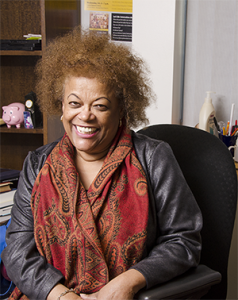
As a young girl, there were signs Carmaletta Williams was meant for a life of teaching and writing. In kindergarten, she had to change classes because her cousin would always have her check her homework before turning it in.
“Our teacher said ‘Both of us can’t teach Judy [her cousin],” she said.
But in spite of completing a bachelors, masters and doctorate degree in English, she took a job in radiation therapy at KU, where her mother worked as a nurse. Her mother wanted her to pursue a medical career but Williams quickly realized it wasn’t for her.
“If I lost a patient, I cried and I was just too upset,” said Williams. “[Her boss] said ‘You just have to get used to it.’ I knew I couldn’t get used to it. There were other things I could do.”
Williams then got a job with a contracting company.
“I was a project manager there and made a boatload of money and was more miserable than I’d ever been,” she said. “So I saw an ad in the paper for [the college] for somebody to teach mythology and I thought ‘Hmm, I had an A in mythology in graduate school.”
She was hired as adjunct faculty at the college and at Longview Community College. When both schools offered her a full-time position, she chose JCCC.
Williams’ graduate research focused on racial identity formation. She has published books on her family’s history, the Harlem Renaissance, Langston Hughes and Zora Neale Hurston. She portrayed Hurston in a one-woman play. In addition to her English courses, Williams also taught African American studies courses.
When the college’s diversity committee decided to open an office devoted to promoting diversity, Williams was asked to lead it. The Office of Diversity, Equity and Inclusion (ODEI) opened in 2008.
“We decided that we were really interested in transformational learning; that we didn’t just want to bring speakers here and have them talk for 50 minutes and that was it,” said Williams. “We really wanted to bring people here let them tell their own stories. We also had book talks associated with the speakers so that people would actually be transformed by what they heard.”
One of the first communities the ODEI worked with was people on the autism spectrum. Two faculty members who were on the spectrum approached Williams for help.
“I had been in the job about 5 minutes,” she said. “I hadn’t even put my purse up. [They] were saying ‘You know I’m having these problems and I’m not sure if it’s because I’m autistic or because I really need help as a teacher.”
The next year the ODEI organized a two-day conference on autism, which became an annual event.
“We didn’t decide what parts of diversity or what kinds of diversity we would celebrate: that was brought to us.”
However the ODEI ran into some controversy, including the sudden resignation of its program director, Jason Rozelle.
“I know that [Rozelle] was completely committed to students and student success,” said Williams. “I do think that probably a personal issue was his downfall. And my efforts to help failed because I didn’t get the help I needed.”
The ODEI was closed at the end of 2012. The official reason given was the college wanted to de-centralize diversity efforts. Williams has difficulty believing that.
“I don’t think it’s a secret that I was told that they wanted diversity to look different. I think that students found a safe place with us. And these are all kinds of students,” said Williams. “And I think that because it was so new and so different that it kind of gets scary to people.”
Since the closing of the ODEI, Williams has seen some efforts towards diversity and inclusion, such as having bilingual recruiters for Latino students. She also participated in the discussion with Tanner Colby. But compared to when the ODEI was running, it isn’t enough.
“[ODEI] was a significant, significant and important part of this institution and I thinks it’s also a severe disservice to this community that it’s closed,” she said. “I think there is a very low-key, very slow movement [towards those goals]. But I’m really sad that momentum we had going has stopped.”
While Williams is retiring, she shows no signs of slowing down. She has a children’s book coming out, a performance as Zora Hurston that will air on KCPT and she is doing research for a book on slavery and motherhood.
“If you didn’t own your own body, what does it mean to have children?”
She has also been invited to be a guest lecturer at a university in Wuhan, China.
“I’ve never been to Asia, so I’m excited about that,” she said. “And I have grandkids and a large family. So, I have plenty to do.”






















